Three Things I Am Never Going to Do Again in My Life Call a Boy Sir
Christie Blatchford: The other sibling'due south decease and what the jury didn't hear in the Biddersingh trial
The jury has begun deliberating whether Everton Biddersingh is guilty of murdering his daughter. But jurors only heard half the family's sordid history
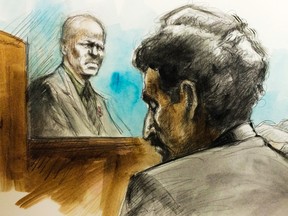
As a fully formed adult with 41 years on the planet now under his belt, Cleon St. Aubyn Biddersingh is a huge, handsome hulk of a shaved-headed man.
At a quick glance, if you don't catch the wounded softness in his eyes or that curiously cowed attribute of his body language — it's every bit if he were braced for some sort of coming blow — he might even pass for intimidating.
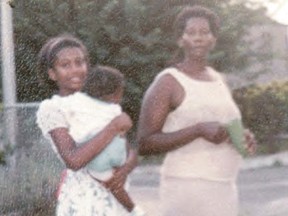
The jurors at the murder trial of his father, Everton, who was bedevilled of first-degree murder Th after just a day of deliberation, should be forgiven for wondering how it is that this strapping man, even every bit a 20-something, could have been and then frightened that he didn't raise a finger to help his terrorized one-half-sis Melonie or, for that matter, himself?
Cleon struggled mightily to explain it, especially in cross-examination, when he testified at the trial for several days this fall.
He was being questioned by Jennifer Penman, one of the lawyers representing his and Melonie'due south now 60-year-old father, who is pleading non guilty to first-degree murder in the teenager's death on Sept. 1, 1994.
The placidity 17-yr-quondam, experts said, was probably drowned and certainly starved. Her emaciated 50-pound body, with its 21 different fractures, was stuffed into a suitcase and set up on burn near an industrial garbage bin northward of Toronto.
Given that no one — including Cleon — ever reported her missing, Melonie's remains went unidentified for 17 years.
There was a secret, a big fat ane, and though all the lawyers and Ontario Superior Court Judge Al O'Marra knew it, the jurors didn't.
For almost two decades, as Toronto Police periodically tried to flush out someone who recognized her through sketches and even a sculpture of her head released at printing conferences, she was known only equally the girl in the burning suitcase.
And living with Melonie at the time of her expiry in a crowded Parkdale apartment, along with iii of Everton and Elaine Biddersingh'due south own precious children, was Cleon.
"September 1994," as Penman put it once coolly. "Y'all're at present xx years old? You're out and well-nigh dealing drugs (purportedly at his father's control)?"
"I'1000 xx," Cleon said, "only I didn't feel like I'm an developed, living in that house."
"Y'all don't do anything (to aid Melonie)? You don't run away?" Penman said.
"I was scared for my life," said Cleon, and hither he got weepy. "I should have … when I think, I do recollect virtually my sister getting browbeaten. I should have dedicated her. I was scared."
Penman moved to the dark Melonie died.
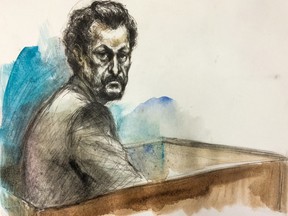
By Cleon'southward account, Everton woke him upward in the wee hours, told him she'd run abroad, and ordered him to search the flat while he and Elaine ostensibly went out in the car to wait for her.
Cleon never believed the story in his heart — Melonie was so weak past and then she could barely stand, had no coin and no resource, and knew no one in the urban center where she'd been finer held prisoner for 3-and-a-half years — but he hoped it was truthful.
The human capacity for denial, after all, is boundless.
Nonsense, the lawyer said, and accused him of always knowing that Melonie was dead and of doing zippo about it.
"You knew," Penman said, voice scornful, "if you lot chosen police and said Everton and Elaine did all this, they would have helped yous?"
"I should take, aye, I should have," Cleon said, and here he was the very picture of abject shame. "I blame myself."
"You needed to go on it (Melonie's death) a undercover?" Penman sneered.
"In that location's no secret," Cleon said.
But of course, there was a hugger-mugger, a large fatty one, and though all the lawyers and Ontario Superior Courtroom Gauge Al O'Marra knew it, the jurors didn't.
The secret explains why Cleon was so crippled by fright even as a strong boyfriend, why he was past his silence about Melonie'southward lethal abuse complicit in information technology and is now riven with guilt, and why both of them felt then fundamentally helpless.
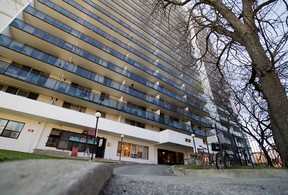
The secret had a proper name, Dwayne Ricardo Biddersingh, but everyone chosen him by his pet proper noun of Sabo.
He was Melonie's little blood brother, Cleon's one-half-brother: All three were fathered past Everton, just Melonie and Sabo had the aforementioned female parent, Opal Austin, while Cleon's female parent was Beverly Scott.
And Sabo's sudden death, at the ripe erstwhile age of 13 on June 15, 1992, was a portent of everything that was to come — Melonie's prolonged and terrible suffering, a killer (or perhaps killers, Elaine is besides charged with beginning-degree murder but will be tried next leap) going free and unaccountable for so long, and Cleon's paralysis.
It is a brutal bit of irony, only simply as Melonie and Cleon were threatened into silence about the circumstances of Sabo'southward death, such that information technology must have seemed to them he inappreciably always existed, and so was the boy's name barely mentioned at his father'southward trial.
All anyone could say about him in front of the jurors — the boy that Ava Stewart, an one-time family friend from Jamaica, lyrically described at Everton's preliminary hearing as "this somebody that brings lights to the room," an ebullient, noisy, utterly winning kid — was that sadly, he died accidentally.
This was a effect of a pretrial ruling made on October. 15 by Judge O'Marra.
They never heard the real story of the troubling circumstances of Sabo's brusque fourth dimension in Canada or the ghastly impact his death and its aftermath had on his surviving siblings.
Prosecutors Mary Humphrey and Anna Tenhouse wanted to innovate evidence surrounding Sabo'south decease, telling the judge that without it, "It would be incommunicable for the jury to sympathise" why Melonie and particularly Cleon were unable to disembalm the abuse, cry for aid or run away.
"The show reveals an atmosphere of fear," prosecutors wrote in their factum on the motion. "Since this is a common cold case that was unsolved for approximately 17 years, information technology is essential for the jury to understand the reasons for the delayed and lack of disclosure."
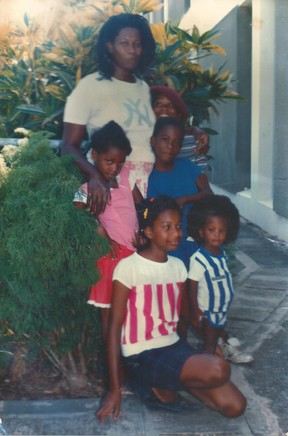
But the judge decided that "the evidence surrounding Dwayne's death," including statements he allegedly made the twenty-four hour period he died, was inadmissible.
Prosecutors were allowed to apply the decease only "equally a chronological marker" in the full general narrative of the Biddersingh family unit in Toronto and had to carefully instruct several witnesses, specially Cleon, that they weren't allowed to discuss what happened to Sabo before the jurors.
If it was a legally defensible and ordinary ruling — such "prior discreditable conduct" evidence, every bit it'southward chosen, is commonly kept from jurors on the grounds that it carries too much power and could unfairly prejudice them confronting the accused — it also makes a mockery of what O'Marra told the jurors in his opening remarks.
Twice he told them, as Canadian judges so often practice, that there would be times when he and the lawyers had to "discuss legal issues" in their absenteeism.
Merely, he said, "Information technology is zippo to practise with your decision in the case and we're not trying to hide anything from you."
In fact, a adept deal was hidden from the jurors.
As a result of O'Marra's ruling, they never heard the real story of the troubling circumstances of Sabo's short fourth dimension in Canada or the ghastly impact his expiry and its aftermath had on his surviving siblings.
Everton'south three Jamaican kids — Cleon was the oldest, and so 17, Melonie thirteen, Sabo 12 — were sent to Toronto on Jan. 25, 1991, by their impoverished Jamaican moms to bring together Everton and his wife Elaine.
Even on the flying to Toronto — their first — the kids, as Cleon told the jurors, were all practically blowing upwardly with excitement.
Theirs was the usual immigrant's dream — a better life, more opportunity, the big chance — with the Jamaican twist that a family unit's kids are often sent to join whomever in the sprawling extended clan is doing even marginally well in Canada and the United States, because marginally well in either of those countries is however then much better economically than it is for so many in Jamaica.
Even on the flight to Toronto — their outset — the kids, as Cleon told the jurors, were all practically blowing upward with excitement.
It went sour almost immediately.
The Biddersinghs by now had two young boys of their own, and Elaine was pregnant with the third kid, a daughter.
Into the cramped confines of that small one-bedroom flat on the 22nd flooring of a Shut Avenue high-rise came this trio of long-limbed land kids from Jamaica, each with a single suitcase holding all they owned in the world.
Within a week, Elaine was openly doubting that Cleon fifty-fifty was Everton's son; he had "nigger pilus," she said, and he didn't expect like his father.
It became such an issue in the household that Everton and Elaine ultimately marched him downwardly to go a Dna test. It proved he was indeed his father's son, but did little to improve the mode he was treated.
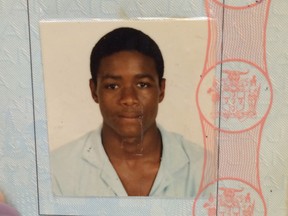
That was Cleon'due south welcome to Canada: He was such a immature 17, with the open trusting face of the boy in his passport picture, and now his father didn't seem to want him and his stepmother didn't seem to even similar him.
Soon, Cleon was having to scour the bathroom subsequently using it, lest a vile hair of his contaminate the place, and with his Jamaican siblings had to employ separate dishes from the precious Canadian-born children, lest their germs dirty the others.
Later, they were fed different, lesser food, forced to swallow on the flooring, and eventually, they were given less and less nutrient. Cleon's pride was deeply injured, for instance, when they were given cornmeal, which in Jamaica is fed to dogs.
None of the three ever walked through the doors of a school, though all had gone in Jamaica and had large plans: Cleon was a gifted runner and dreamed of competing in the Olympics; Melonie wanted to exist a nurse; and Sabo, equally befits a kid who could dazzle and hold a room, wanted to be a singer.
Even with his father and stepmother, Sabo managed to finagle a little freedom, more certainly than Melonie ever had.
Cleon had the nearly, merely never felt gratuitous. He said Everton got him a pager, showed him how and where to sell crack cocaine, and oftentimes watched him from the balcony as he headed out on his bike to deal; all the money was turned over to Everton.
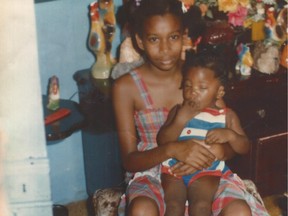
Melonie had the to the lowest degree freedom of move.
She was never allowed out of the apartment unless Everton or Elaine was with her, and was the primary caregiver for the couple's baby daughter. When the only regular visitor to the apartment, a friend of Everton'south, came over, Melonie was usually blimp into a cupboard and hidden.
The few people outside of the family unit who always clamped eyes on her — such as Ava Stewart, who knew Opal and her kids from Jamaica but now lived in Toronto — never saw her without the infant on her lap, and usually from a distance.
Yet Sabo, somehow had convinced Everton and Elaine to allow him piece of work as a paper boy for the Toronto Sunday Sunday.
Capable boy that he was, Sabo managed to track down Stewart, and began showing upward occasionally to visit her. "I don't know if he was doing his route," she testified at Everton'southward preliminary hearing, "only anytime he had a chance, he would merely popular in."
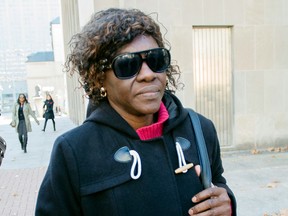
Then Stewart, now 44, left her grandmother'southward and moved out on her own, far abroad from the Parkdale area in the western downtown area of the city where the Biddersinghs lived.
Merely somehow, the ingenious Sabo institute her, and one Sunday in June of 1992, he but turned upward. Stewart remembered the visit because her sis and a girlfriend of theirs from Jamaica were over, because her basement flat suddenly filled with the laughter and dissonance Sabo always brought.
Stewart made them all dinner, and Sabo asked if he could slumber over, and she said sure, but call your father to let him know. She didn't think he did.
"We were happy," Stewart said of that night. "We were having fun … he (Sabo) was playing, talkative you lot know." She slept on the sofa bed in the living room, giving up her bed for her guests.
The side by side morning, she said, she was wakened by a knock on the door: It was Everton. He wanted to know if Sabo was in that location.
He bound out of his slumber, and the outset affair that came out his mouth was, 'He's gonna impale me.'
"So he was sleeping," she said, "so I pat him on the shoulder to wake him upwards, and I said, 'Your dad's here,' and he was asleep, so, you know, he leap out of his sleep, and the get-go matter that came out his oral cavity was, 'He's gonna kill me,' and so the whole morning was a chaos.
"He didn't desire to go …
"He was frantic, how would you describe it, frantic, like, you lot know, it's things he was proverb."
Stewart had difficulty remembering the detail of what Sabo said that day — it was 20 years earlier, in fairness — just she and the other two women "realized that something was going on" because the boy "was frightened."
Sabo went with Everton, of course; Stewart could hardly finish him.
But the same day, Everton was knocking at her door again, demanding to "know what Sabo discussed with me … He wanted me to tell him everything that Sabo had talked about with me," she said.
"Well, he (Sabo) never told me anything the night before, and then I couldn't have told him (Everton) anything." Everton, she said, "wasn't happy, he was angry. He wanted me to give him information. I didn't take any information to give him."
The details of the boy'due south death remain murky, equally ever they volition, given the circumstances.
Stewart was bewildered, couldn't figure out what was going on, simply some time later, she got a call from her mother in Jamaica, "and she's proverb to me, 'Is information technology true? Is it true?' And Opal (Sabo's mother) is in the background crying and my mom was maxim Opal (was saying) Sabo is expressionless, and I said, I don't know what y'all guys are talking nigh."
So Stewart called Everton, told him what she'd heard, and he confirmed information technology: Sabo was expressionless, or as Stewart told Toronto Police when they interviewed her almost two weeks later on, Everton replied, "Yes, everything'southward alright, but he is expressionless."
The details of the male child's death remain murky, as e'er they will, given the circumstances.
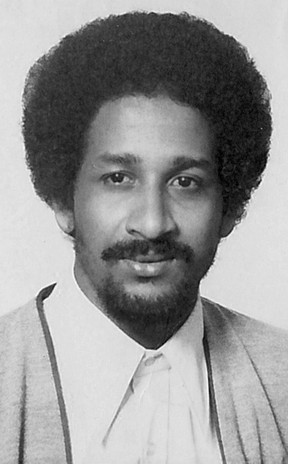
Simply what is articulate is that the same solar day he went back home to Parkdale with his begetter, apparently frightened out of his skin, Sabo either jumped from the balcony, slipped trying to get onto the neighbouring one or somehow went over the railing; his body was discovered on the front lawn.
Police were dispatched, evidently, with Kim Carr, at present retired from the force but then a fourteen Division detective, in charge. The building superintendent identified the boy'south apartment, and they headed upwardly to suite 2203.
Cleon answered the door. Just he, Melonie and the baby were in that location, Everton and Elaine having left the flat. Cleon told them that Sabo had been acting upwardly, was jealous of the attending Melonie got, and that he'd beaten Melonie upwards the day before.
He said that after Everton brought Sabo home, Sabo didn't seem upset. Cleon said that his parents called him into the bedroom, and and so "We heard the balcony door open up and he came out and saw him standing on the railing and he only jumped, man, he jumped."
Sabo, meantime, was pronounced dead at St. Joseph's Infirmary.
Everton called from a telephone booth, Carr said, and told him he knew what had happened, "but could not deal with it yet and that his wife was screaming, crying, trembling and he had to deal with her first."
In the flat, constables Irene Hussar and Joy Zentner were interviewing Melonie.
Hussar noted an astonishing array of injuries on the girl, then just xv — welts and scratches covered her artillery and legs, there were welts on her breadbasket, a cut to her head, and she had a bloated nose, swollen ankle and hand.
Hussar'southward handwritten notes of the daughter's injuries, entered at the preliminary hearing, run to two total pages.
"Did Melonie receive any medical attention for these injuries?" prosecutor Tenhouse asked her at the prelim.
"No," said Hussar. "We wanted to provide her with medical attending, but she said that … well, her brother (Cleon) said that the infant would start crying if she was to exit."
Fully two years and three months before the $.25 and pieces of her own ruined body were found in a torched suitcase, Melonie Biddersingh was already so desperately hurt that her injuries took 2 pages to item.
Melonie blamed Sabo for her injuries.
Both officers were young, notwithstanding they detailed the injuries and filed supplementary reports, as they're chosen, for Carr.
Neither notified kid-welfare regime, because, as Hussar testified, "that was (the purview) of the detective (Carr) and the detective-constables that would accept continued with that, with the matter."
Carr received some other supplementary report, from two officers who finally interviewed Everton and Elaine — at their asking, in a Dairy Queen parking lot — the night Sabo died.
Finally, three days later, he interviewed the parents himself.
Everton told him Sabo had been causing issues in Jamaica, that he was jealous of Melonie, that he'd threatened suicide before, and that only before he'd jumped from the balcony, Everton had told him he'd have to send him back to Jamaica if he kept hurting his sister.
"At no fourth dimension was anyone else on the balustrade with Dwayne," Carr wrote in his own report. "Mr. and Mrs. Biddersingh left the flat because they could non face what had happened and did not even stop to look at the body."
Carr added, in a section he labelled "Officer's Stance: Information technology is the stance of this officer that the family are telling the truth in this matter and that forensic exam volition confirm this."
He believed what Everton, Elaine, Cleon and Melonie, singing equally i, had told him: Bad Sabo had beaten up Melonie, and and then he had jumped off the balustrade. The "sudden death investigation" never became a criminal investigation.
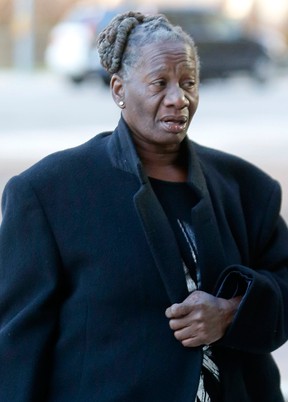
Eventually, in consultation with the coroner, the decease was ruled a suicide, the example closed.
The law weren't the only ones to take missed an opportunity.
From her home in a poor Kingston ghetto, Opal Austin, a roadside vendor of cigarettes and sweets, was virtually without resources. She had no telephone, no money, no power.
But she had one friend who knew someone who knew someone, and when Sabo died, she begged him for help.
Ultimately, the Jamaican government wrote her a letter, dated June 17, 1993, smack in the middle of the deaths of the two kids she had sent to Canada.
Signed on behalf of the permanent secretary for the Ministry of Foreign Affairs and Foreign Trade, the letter represented that "the Jamaican consulate in Toronto had contacted Melonie and were satisfied that she was doing well. She is scheduled to begin schoolhouse in September of this year, but currently stays domicile with her younger brother and sister. (In fact, Melonie had ii younger half brothers and a one-half sis.)"
The consulate also "carried out investigations into the decease of Dwayne Biddersingh" through interviews with official sources and, of course, Everton Biddersingh.
The father, the letter of the alphabet said, reported that "Dwayne was very daring" since he arrived in Canada, and said that later existence brought home post-obit his run a risk at Ava Stewart's, he had "gotten upwards suddenly, ran to the balcony and jumped over, without warning or reason."
The police and coroner investigated, the consulate reported, only "in that location was no indication of him being pushed."
Oh, and except for Dwayne'due south death, the letter said the consulate found that Melonie "seems to exist quite happy."
The lesser line is that in June of 1992, fully two years and three months before the bits and pieces of her own ruined body were constitute in a torched suitcase, Melonie Biddersingh was already so desperately hurt that her injuries took two pages to detail.
Could she have been saved, if constabulary had chosen in a child-welfare bureau, or taken her to a hospital that nighttime, where a nurse might take notified children'south assistance, if someone in potency had not found Everton Biddersingh to be such a reliable historian? Perhaps she could have been, but child-welfare agencies sometimes driblet the ball, too, and there's no guarantee they would have followed through.
What is certain is that the abuse that was plainly even in 1992 then grew much worse, and that (Melonie) endured it for 27 more than months.
Simply what is certain is that the abuse that was evidently even in 1992 and then grew much worse, and that she endured it for 27 more months.
When, in 2011, Elaine Biddersingh in a sort of self-serving quasi-confession told her pastor that the girl in the suitcase was her married man's daughter and the pastor reported and Toronto Police were finally able to identify the girl and began investigating Melonie's decease, they likewise reopened the investigation into Sabo'due south.
His body was exhumed and re-autopsied, but in the finish, his death remains classified equally a suicide.
-
Christie Blatchford: Suitcase of hope became receptacle of expiry for immigrant girl from Jamaica
-
Christie Blatchford: Witness shows little regard for the truth — or her expressionless stepdaughter
-
Christie Blatchford: Father on trial for daughter's murder, more than 20 years after her grisly death
But dorsum then, the effect upon Cleon and Melonie must have been staggering: There was Sabo, the only 1 of them to have ever run away and only then for a night, and what happened?
He was found, he was brought back home, and inside hours, the same day, he was expressionless.
Cleon, the primal prosecution witness, could talk near none of this in forepart of the jurors. He couldn't tell them that he was with Everton and Elaine when they went to notice Sabo. He couldn't say that Everton was angry, that Sabo was scared, that in the motorcar on the manner home, Everton said, "You think yous tin can run from me. Wherever you lot get, I volition discover you. You guys tin't run from me."
One of the many things that were verboten at the trial was something Melonie had told Cleon not long earlier her death.
What Cleon was allowed to say was that she'd told him this: "I tin can't take information technology anymore. Information technology ameliorate I expressionless."
What Melonie had really said, but the judge edited the concluding part out, was, "It meliorate I dead, information technology'south better I become like Sabo."
Sabo Biddersingh, as the late, great Canadian Marshall McLuhan famously wrote, was the medium and the message, however he ended upwards flying off that balcony. He was the lesson.
Source: https://nationalpost.com/news/canada/christie-blatchford-the-other-siblings-death-and-what-the-jury-didnt-hear-in-the-biddersingh-trial

Publicar un comentario for "Three Things I Am Never Going to Do Again in My Life Call a Boy Sir"